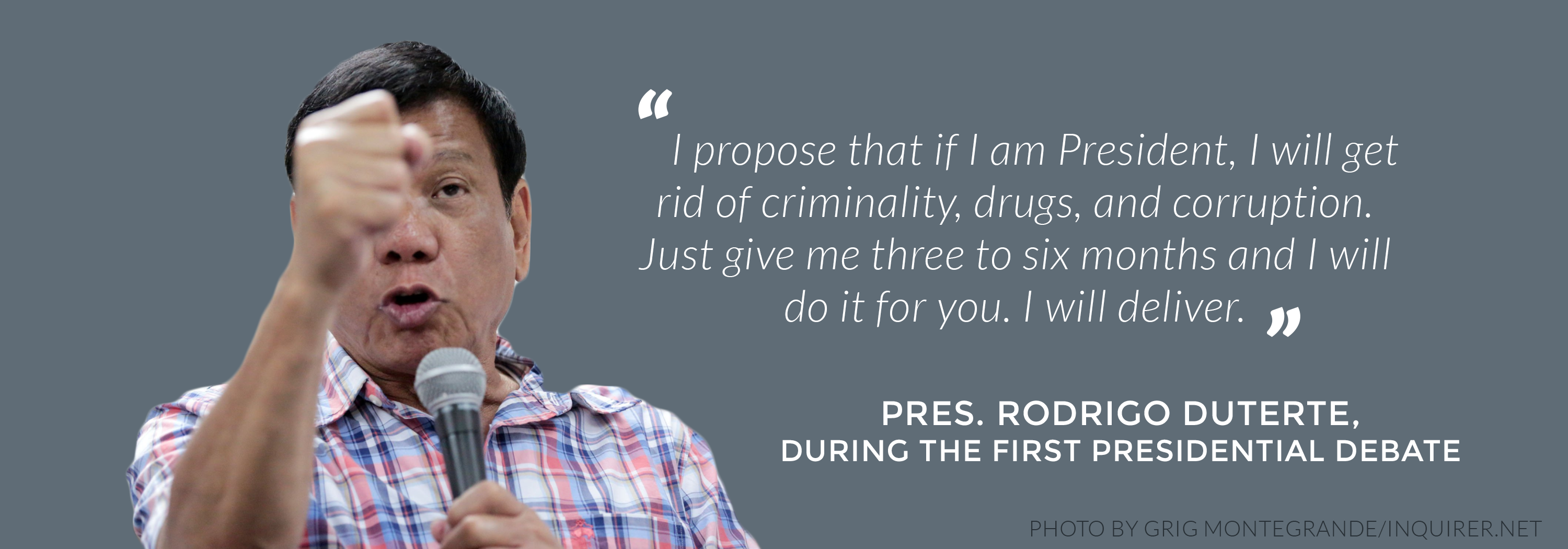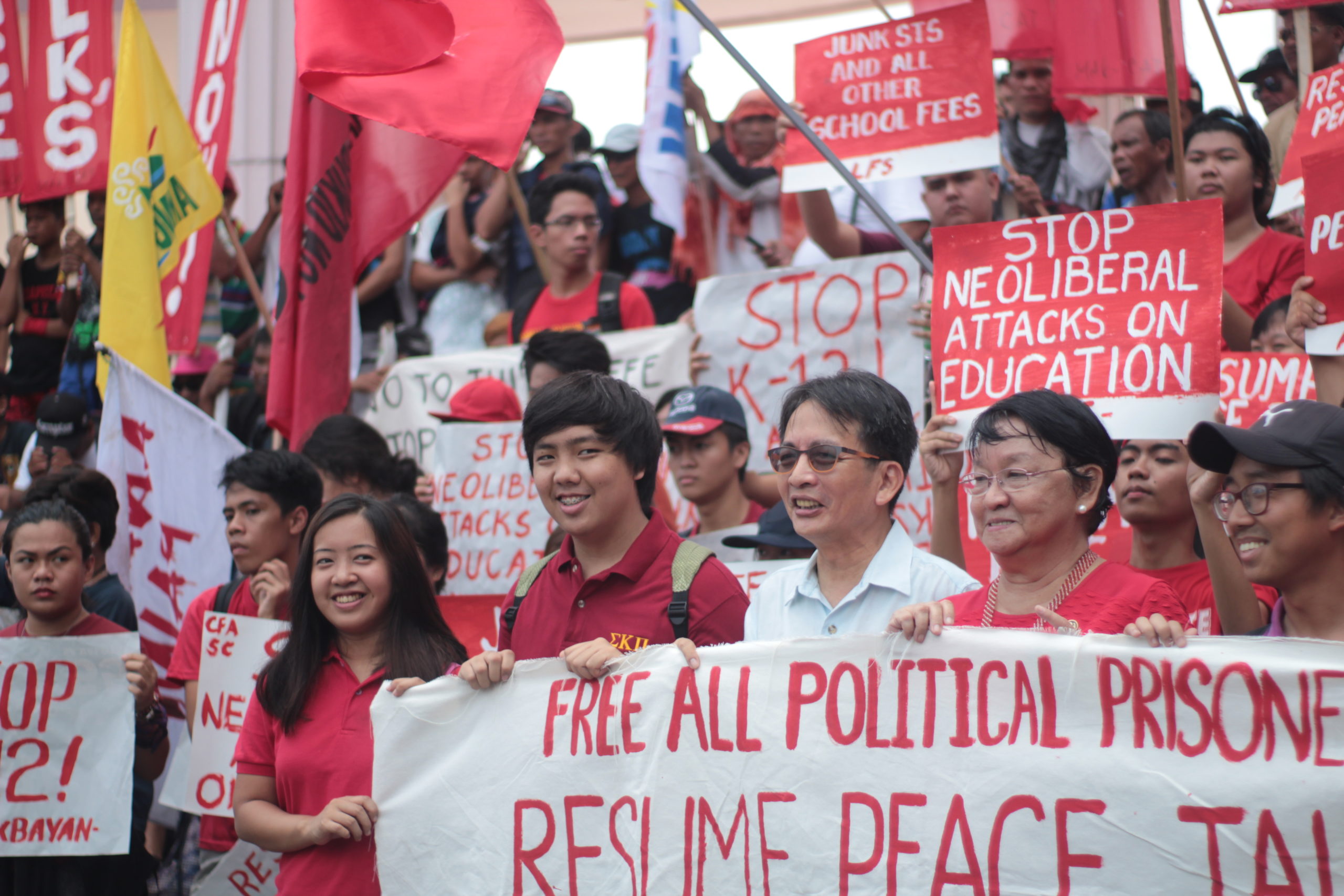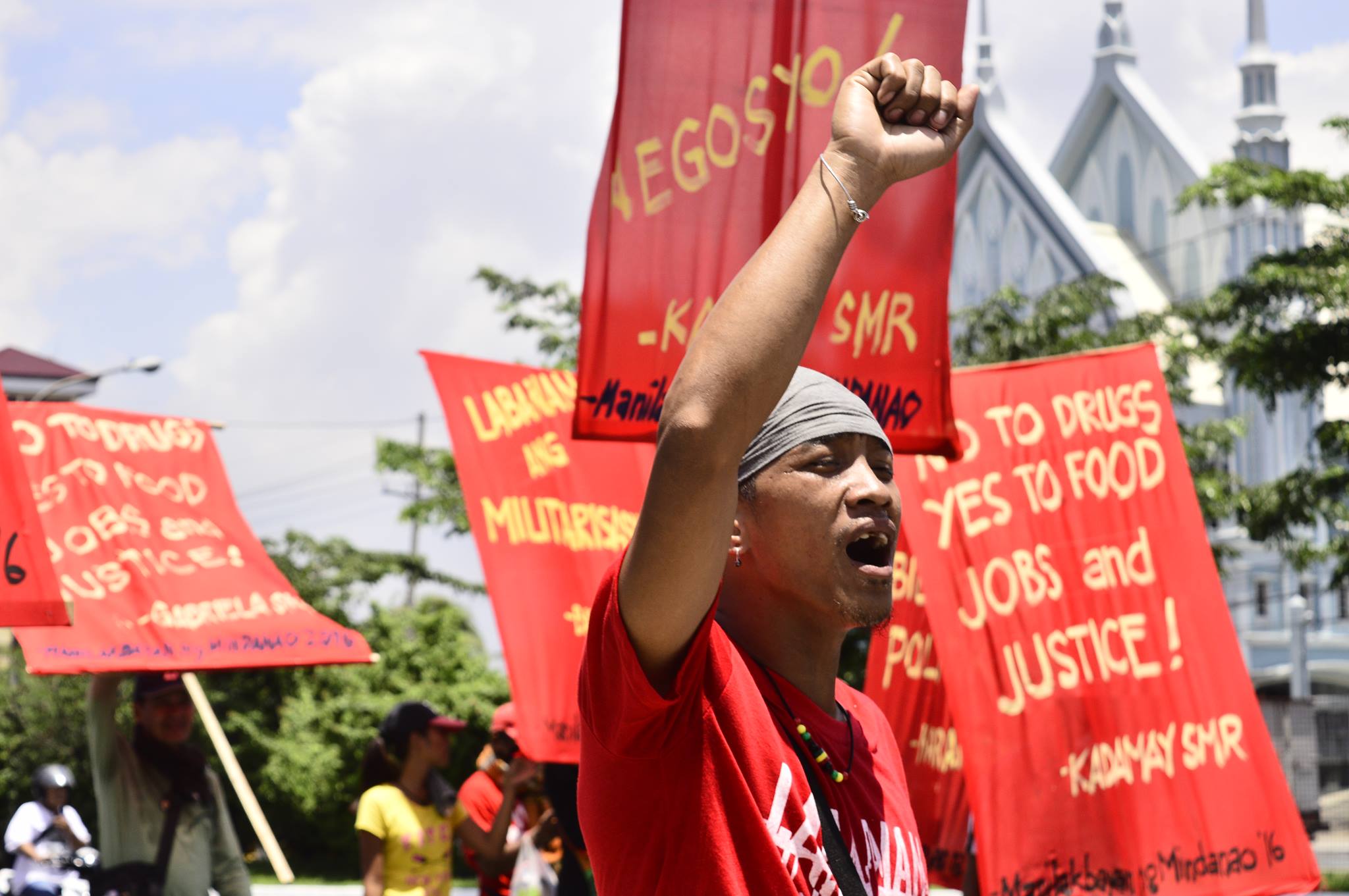BY GABRIEL SANTE | INFOGRAPHICS BY MISTY PEGRAM
The first month of the Duterte administration can be sacked and cardboard-tagged “anti-crime,” giving Filipinos a glimpse of President Rodrigo Duterte’s promised change.
Duterte vowed to eliminate crime and corruption in the country, among others, and is now working on fulfilling that promise.

Drugs and crime
Since his victory in May, hundreds of killings related to Duterte’s war on drugs and “voluntary surrenders” all over the country have been reported. On July 26, Inquirer.net’s “Kill List” showed 411 killings from May 10 to July 21. Among fatalities are some who surrendered in Oplan Tokhang, killed during buy-busts operations, or alleged drug users and pushers, among others.
A summary report released by Camp Crame July 19 revealed that 194 drug suspects had been killed from July 1-19.
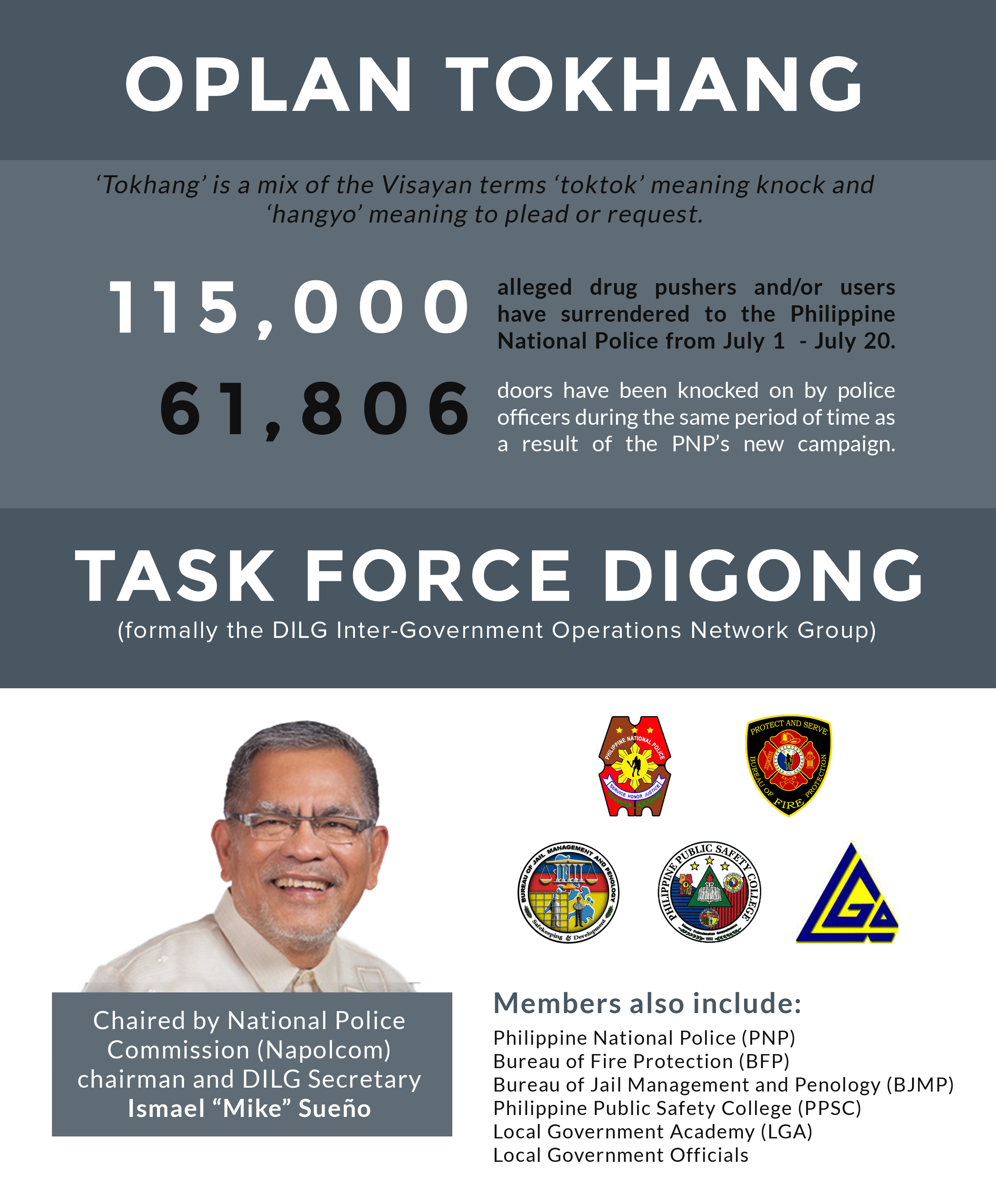
To combat drugs, Duterte plans to double the salaries and increase incentives to the military and police to prevent them from engaging in illegal activities.
Oplan Tokhang, a project the Philippine National Police (PNP) launched to wipe out illegal drugs resulted in the raid of 61,806 houses of suspected drug personalities, the surrender of 114,833 illegal drug suspects and the arrest of 2,789, as of July 22.
Three thousand new police officers and two army divisions will target organized crimes and urban terrorism.
The curfews, liquor and smoking bans that were enforced in Davao as ordinances are now in effect throughout the whole country. The hotline numbers 8888 for complaints and 911 for emergencies are to be implemented by August.
Extrajudicial killings, the mass media, and FOI
During the campaign period, Duterte pledged to kill 100,000 criminals in his first six months in office. He even assured the cops of a presidential pardon for the drug killings.
However, not everyone is in favor of the Davao mayor-turned-president’s way of fighting crime.
Even before his assumption in office, Senators Panfilo Lacson, Leila de Lima and Risa Hontiveros had said that they will not hesitate to investigate Duterte if they think the highest official of the land is committing any violations or government abuses.
Many citizens, including members of the press, have also shown their dissent through social media.
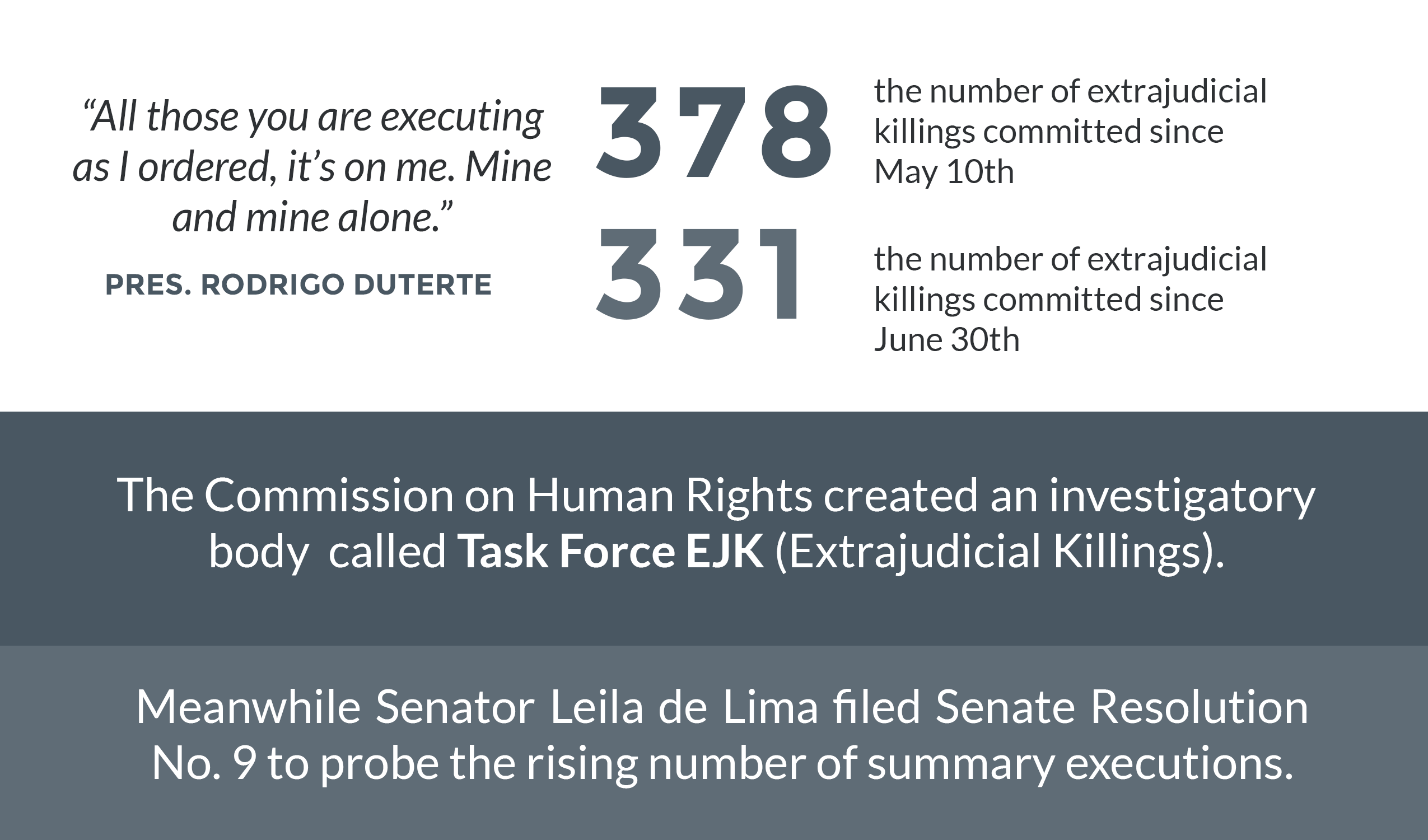
Duterte, however, remains unmoved. He eventually dared the media to boycott him and refused to give interviews because of the media’s remarks on these killings.
Yet in a heel-face turn, Communications Secretary Martin Andanar confirmed Sunday at a press conference in Davao the signing of an Executive Order operationalizing the people’s right to information throughout the Executive branch.
The first FOI Bill was filed way back in 1988. Duterte’s predecessor, Benigno Simeon “Noynoy” Aquino III promised its realization. In the former administration, a draft was made in 2011 and deemed ready by the following year, but much to the public’s dismay, the attempt to pass it as a law was unsuccessful.
Social services
Meanwhile, Duterte’s first executive order re-engineered the government offices to address anti-poverty, food security, urban development, and different sectors particularly the Muslims, indigenous people, women and youth.
He’s also willing to invest money and rebuild V. Luna Hospital to provide better medical treatment in Quezon City.
Political prisoners and peace talks
With regards to political prisoners, Duterte says he is “not ready” to release detained communist leaders and members of the Communist Party of the Philippines (CPP), National Democratic Front (NDF) and the New People’s Army (NPA).
“I am not ready to release everybody. Only after the success of the talks, if there’s one coming our way bago ko sila i-release, now we can grant amnesty but they have to lay down their arms,” Duterte said in his speech during the 69th anniversary of the Air Force.
However, Department of Agrarian Reform (DAR) secretary Rafael Mariano and Department of Social Welfare and Development (DSWD) secretary Judy Taguiwalo, both appointees of the president, come from progressive groups.
He instead ordered the temporary release of 11 political prisoners to accommodate the peace talks in Oslo, Norway on August 20-27.
According to human rights group Karapatan, there are 543 political detainees in the country, 18 of which are consultants, 88 ill, and 48 already in their senior years.
Vigilance should still be the priority of everyone — supporters and critics alike.
After all, it is just the beginning.
Duterte junked the Bangsamoro Basic Law (BBL), meanwhile approving the “Roadmap for Peace.” The administration is still going to implement the Comprehensive Agreement on the Bangsamoro (CAB), signed in 2014 by the Moro Islamic Liberation Front (MILF).
The Duterte administration, under the peace roadmap, would still pursue peace talks on all fronts and work on implementing peace agreements that have already been signed with the Moro National Liberation Front (MNLF), and the CAB with the MILF, along with emphasizing inclusivity of all Bangsamoro factions in the implementation of these agreements.
Vigilance
It has only been 24 days since the unconventional, tough-talking former mayor of Davao took office. His actions since then garnered varied reactions from the public. Having a different background and place of origin from his predecessor, Duterte continues to draw attention from people with regards to his decisions, interactions, behavior and ways of dealing with the newfound scrutiny of the public.
For the past 24 days, the country has witnessed some of Duterte’s promises come to life as he slowly ticks things off his presidential bucket list. However, vigilance should still be everyone’s priority–supporters and critics alike. After all, it is just the beginning.
Note (07/26/2016): The article has been updated to address conflicting tallies of extrajudicial killings.
Erratum: In addressing the victims of the anti-drugs campaign, the words “alleged” and “suspected” have been inserted in some paragraphs, as pointed out by one of our readers. We apologize for overlooking this matter.
